In a move that has rattled the foundations of intellectual property rights in the United States, President Donald Trump has controversially dismissed Shira Perlmutter from her position as head of the U.S. Copyright Office. This decision has drawn significant criticism, with many allegations suggesting that her termination was a politically charged act aimed at loosening regulations around copyrighted material, particularly concerning artificial intelligence. Representative Joe Morelle, the leading Democrat on the Committee for House Administration, did not hold back in labeling the dismissal as “a brazen, unprecedented power grab,” which betrays a deeper agenda aligned with powerful tech interests.
The timing of Perlmutter’s dismissal is particularly revealing; it came almost immediately after she declined to endorse a proposal from Tesla and X (formerly Twitter) CEO Elon Musk, who sought unfettered access to troves of copyrighted materials for AI training purposes. This scenario raises alarms regarding the lengths to which powerful figures like Trump and Musk may go to reshape copyright laws to their advantage, undermining decades of legal precedent crafted to protect content creators and their works.
The Complicated Intersection of AI and Copyright
Perlmutter’s leadership at the Copyright Office was marked by a careful balancing act between protecting creators while navigating the murky waters of technological innovation. Under her tenure, the office released significant guidelines indicating that companies looking to develop AI models must tread carefully. The latest report emphasizes that while certain uses of copyrighted materials could be considered “fair use,” exploiting vast collections of such works for commercial gain crosses ethical and legal boundaries.
What’s particularly concerning is the suggestion that “alternative approaches,” such as extended collective licensing, should be considered to foster a more flexible environment for tech companies. However, these approaches might inadvertently erode the very foundations that ensure that artists and creators are compensated fairly. The idea that AI should be allowed to capitalize on copyrighted works, perhaps with minimal compensation, threatens to put profits over principles, undermining the creative spirit.
Political Puppetry and Corporate Interests
This unsettling shift in the leadership of the Copyright Office raises questions about the integrity of decision-making in governmental agencies. Trump’s actions, paired with his history of conflict with the creative community, paint a picture of a politically manipulated landscape in which powerful tech moguls exert undue influence over crucial policy discussions.
The connection between Musk, who has close ties to Trump, and this scenario cannot be ignored. As a co-founder of OpenAI and other tech ventures, Musk stands to gain immensely from a regulatory environment that favors AI advancement at the expense of copyright protections. While Musk’s dismissal of copyright issues as “old-fashioned” may resonate with a tech-savvy public, it heavily undermines the legitimacy of the creators who toil tirelessly to produce original works.
Fear of an Unchecked AI Industry
The fear that the AI industry may now operate with fewer constraints is palpable. Major players like OpenAI are already embroiled in numerous lawsuits concerning copyright infringement, a clear indicator that the friction between modern technology and intellectual property is intensifying. There’s a legitimate concern that the loosening of regulations surrounding copyright could lead to rampant exploitation of artistic works, dismissing years of creativity as mere fodder for AI development.
The tension between innovative technology and creative rights is poised to escalate. The notion that AI companies might seek to undermine the financial stability of writers, artists, and musicians while using their work as a springboard for profits presents a looming threat. A call to action is imperative to resist this trend before it becomes entrenched in the fabric of our legal system, potentially locking creators into a perpetual struggle for recognition and remuneration.
The Road Ahead: A Call for Vigilance
As we witness the unfolding implications of Perlmutter’s sudden release, it is crucial to remain vigilant against a potential erosion of rights that underpin our creative society. The choices made today concerning copyright and AI will resonate for generations, making it incumbent upon us to advocate for a balanced approach that respects the rights of creators while allowing innovation to flourish. In a world increasingly dominated by AI, we must fiercely protect the integrity of human creativity. The stakes have never been higher.

